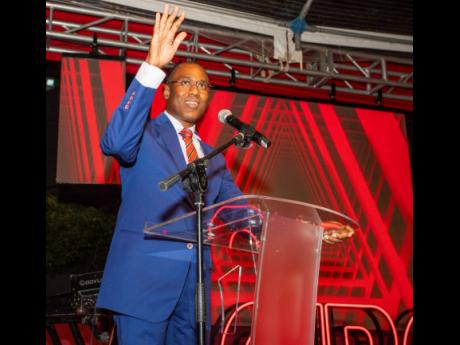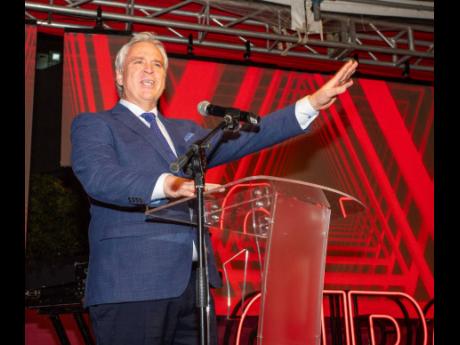CIBC rebranded in a ‘vastly improved’ Jamaica
Dr Nigel Clarke, minister of finance and the public service, has applauded the Canadian Imperial Bank of Commerce for reaffirming its commitment to Jamaica by rebranding and aiming to return the establishment to its former glory.
On January 30, during an evening ceremony on the lawns across from its offices in New Kingston, the local franchise was renamed CIBC, the very name it had in years gone by.
CIBC, with headquarters at the CIBC Square in the financial district of Toronto, Ontario, was previously renamed in Jamaica in 2011 to CIBC FirstCaribbean International Bank after acquiring a majority of shares – between 2002 and 2006 – from FirstCaribbean, which was formed from the merger of CIBC West Indies Holdings and Barclays Bank PLC Caribbean operations.
As guest speaker at the renaming ceremony, Clarke said in 2007, when CIBC was previously renamed, Jamaica had a debt ratio well over 110 per cent, while today the country is around 74 per cent or just below that.
“I consider it quite perfect that, at this time, a strong global brand, such as CIBC, is reaffirming its commitment to Jamaica, and to the Caribbean. At the time that the [last] change happened, in terms of branding, and we introduced a different brand, Jamaica was in a much different place than it is today,” Clarke said.
“The Jamaica of 2024 is vastly improved compared to the Jamaica of 2007. In 2007, our unemployment rate was 11 per cent. The average from 1990 to 2015 was about 14 per cent ... . Today, the unemployment rate is 4.2 per cent,” he said.
Clarke also noted that, back in 2007, Jamaica only had US$1.8 billion in foreign exchange reserves in the central bank, while today, as at December, Jamaica now has US$4.7 billion.
“So, CIBC ain’t no fool! One of the strongest banking brands in North America is reaffirming its commitment to Jamaica and to the Caribbean at exactly the right time ... . With that re-entry ... there will be massive reinvestment in the market of Jamaica, because we want to go places, and there are massive opportunities that are available to provide banking services in a superior, in an internationally competitive way to the Jamaican citizens,” he said.
Clarke recalled his days attending preparatory school where he would be driven past the CIBC Half-Way Tree branch where his mother had an account.
“That was what banking meant to me at first,” Clarke said.
“We have lived through the changes of CIBC’s branding in Jamaica ... going through the various iterations, and in many ways, this represents a full circle with respect to the branding here in Jamaica,” he said.
FOR LONG-TERM PARTNERSHIPS
Steve Forbes, executive vice-president, CIBC International, who flew in to Jamaica mere hours before the start of the event, said the more than 150-year-old bank’s change was not exactly about the logo and colours, it was about the intent behind the brand and a commitment to clients, employees and the communities which the bank operates in for long-term partnerships.
“Why are we changing today? Why are we announcing this? While we were the top 10 bank in the world, we were told coming out of the credit crisis around the world is banks have become too dehumanised. They’ve become too transactional, and our clients wanted us to get back to what banking is all about. It’s about people. It’s about relationships. It’s about trust. It’s about commitment. It’s about confidence, so we embarked on developing a new brand, which we are going to unveil,” said the man who is responsible for CIBC’s brand, marketing, digital sales, corporate communications, media relations, community investment activities and overall client experience.
“We want to be a bank that’s there, every day when you need us most, so behind this brand is our purpose, and behind that purpose is the soul of the organisation, which is to make your ambitions come true,” he said.
Globally, CIBC serves more 11 million clients and has more than 40,000 persons employed. The acquisition in the 1920s caused the Commerce Bank to become one of the strongest networks in Canada with more than 700 local branches, which led to the bank opening international branches in Cuba first, then Jamaica, Barbados and Trinidad.
INNOVATIVE BY ORIGIN
In 1964, the bank operated a floating branch using a vessel named MVG Brilliant along the north shore of the Saint Lawrence river in Quebec; built as the only floating branch in Canada and serving more than 5,000 customers.
Innovative by their core and origin, computerisation for the bank started in 1967, changing banking services in a significant way, moving from handwritten notes in passbook to being the first bank to introduce electronic updating of passbooks in Canada.
He said that, of all the places he went to unveil the new brand in Canada, the United States, Hong Kong and the United Kingdom, Jamaica hosted the best launch event.
For his part, Nigel Holness, managing director, CIBC Jamaica, said historically Jamaica’s relationship with CIBC was birthed out of Bank of Commerce’s Halifax branch in Canada while facilitating its clients trading and exchange of codfish and Jamaican rum.
“For those of us who don’t know, Jamaica’s rum helps a lot in a very cold climate, and saltfish is perfectly matched with ackee for us [while] rum is perfectly matched with the cold weather in Canada, so the record of CIBC speaks for itself,” Holness said.
He also said it was CIBC that allowed FirstCaribbean the ability to maintain global banking relationships so that markets in the Caribbean would not have had any major disruption in global payments and trade.


